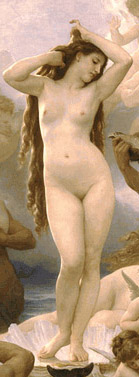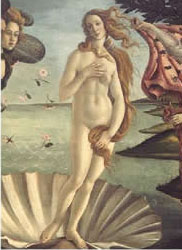| APHRODITE Text and research by Manuela Caregnato for www.ilcerchiodellaluna.it Translation by Katiuscia Cancedda translatethis1@yahoo.co.uk |
Vai alla versione italiana |

The Myth
Greek Goddess of Love, Beauty and the Arts, Aphrodite corresponds to the roman Goddess Venus and is considered by all, mortal or immortal, the most beautiful amongst the goddesses, the most irresistible and attractive, true symbol of Love, which she represents and incarnates.
To Homer, Aphrodite is Zeus’ and Dionne’s daughter, while Hesiod tells of a more ancient myth, according to which she was born from Uran’s penis thrown in the sea by Cronos just after castrating his father. That organ makes a white froth from which the divine maid originates, who is then born from sea waves. As soon as she’s out from the waters, she’s transported by Zephyr to the isle of Citera (= Cerigo, from which the appellative derives)
Euripides describes her birth as follows:
“… Zephyr’s power, the damp rustler, ductile snatched her from the waves of the sea that always roars. The greeting Hours from the golden diadem covered her with immortal garments, girded her head with the golden serio admirably intertwined. In her pierced lobe they put precious flowers of gold and brass, then they adorned the delicate neck and the shiny breast with golden necklaces, with which they boast themselves, and then with golden rings on their hair, they get to the pleasant dance of gods and to the father’s home. Once their deed was accomplished, they took Aphrodite, all splendid in her ornaments, to the mortals. “Welcome” they said, extending their right hand, and everyone fancied her as a bride to take to their own mansion. From violets’ garlands then Citerea arouse wonder and marvel”.
The day of her birth, the Olympus celebrated and all gods were amazed by such beauty, while Era and Athena, from the beginning, felt in their heart the pang of jealousy: they knew instinctively that, from that moment, their supremacy was going to be second to an even more dangerous rival. In fact, no one was able to resist her power: everyone, human and animal, even plants in spring, would obey to her allure.
“She was imagined beautiful and prosperous, all smile the appearance, all golden the clothing; ambrosial scent would come from her sweet figure, and when she’d remove and deploy the girdle of her beauty, every thing would bent to the charm emanated by her body.
She had many lovers, mortals and immortals. The first one was Adone, the handsome hunter, whose ill-fated destiny saw him perishing under to attack of a ferocious boar that caused him to bleed to death from deep wounds. In his honour, the Goddess wanted that, every spring, his remains would come back to life through the blossoming of the anemone with its intense red petals. After Adone, she married Anchise, Trojan prince with whom she gave birth to Enea, hence why the Romans venerated her as their guardian, considering her their ancestor. Nevertheless, her unconditioned help to the Trojans is linked to the legend of the golden apple chucked by Eris, Goddess of Discord, so that it could be allocated to the most beautiful goddess. In that occasion, Zeus ordered Ermes to take Eris, Athena and Aphrodite on the Ida Mountain, where they were judged by Paris whom – while Eris cajoled him with the illusion of a vast kingdom, and Athena with invincibility in war – gave the palm of victory to Aphrodite who only promised him Elena in marriage. Thus the Goddess trooped with the Trojans for the rest of the war.
After Anchise, she married Ephesto, the smoky lame God of smiths. However, her life-time lover was Ares, from whom she had more children (although there are many different versions on this): Eros (Cupid) that is Love (whom, according to one version, was born naturally) and Anteros, or corresponded Love. From their marriage, Demo and Phobo also were born (respectively Terror and Fear), as well as Harmony. Among Aphrodite’s children, Imene has to be mentioned, God of nuptials, to whom young couples would sing solemn hymns during their weddings.
Although Aphrodite was somehow connected to marriage and procreation, she was never identified as goddess of conjugal union as Eris was. She rather represents that force that drives irresistibly a being toward another, which is passionate love. She was in fact depicted on a carriage pulled by sparrows, doves and swans, the body girded with roses and myrtle, wearing the famous magic tie that would make irresistible anyone who’d bear it , because Aphrodite’s charms where interweaved in it – the desire and loving and seducing talk that would deceive even the sage’s heart, as Homer put it. Even Eris, whose relationship with Aphrodite wasn’t idyllic, asked her for the magic tie when Zeus had other amorous adventures in his mind.
Many appellatives were associated to her name, some deriving from the places were she was venerated (Cyprigna from Cyprus; Cnidia from Cnido; Citerea from Citera, etc.), others from tasks assigned to her like Pandemia, meaning “of all the people”, as guardian of her institutions such as marriage and, later, with an elaborated philosophical interpretation, of sensual and profane love, as opposed to her other appellative of Urania, Goddess of intellectual and celestial love.
At a later stage, there was a clear distinction between Aphrodite PANDEMO, Aphrodite URANIA and Aphrodite PONTIA; the first one was the earthly Aphrodite also guardian of vulgar love; the second one was the Goddess of celestial love, giver of all blessings; the third one was the marine Aphrodite, patron Goddess of navigation and sailors. This way, Aphrodite’s dominion extended to all nature and, even if, according to an Indian origin, to begin with, her power was connected to nature’s disruptive and procreative forces, with time her instinctive character eased until all memories of her descent was lost in Greece and she became an exquisitely Hellenic divinity.
In Western countries, Aphrodite’s cult was particularly strong in Sicily on the Erice Mountain, where a Punic sanctuary dedicated to Tanit was located, and fecundity rites were practised apparently along with sacred prostitution. From Sicily, the Goddess’ cult spread through Italy up to Rome where she was venerated under the name of Venus Erycina. Amongst appellatives like Cyprigna, Cyprogena and Citerea, Aphrodite also responded to the following epithets:
Anadiomene (emerged from the sea)
Antheya (Goddess of flowers, so called in Crete)
Apostrophya (misleaders, tacitly from culpable passions)
Aurea (so called from Homer onward)
Callipigia (for her beautiful bottom)
Phylomete (lover of pleasures)
Peristea
Pontica
Tritonia.
Expressions associated to her are: aphrodisiac, Venusian, venereal, veneration, venerable.

The Cult
Born from the sea, Aphrodite was venerated by sailors, not as Poseidon, but as the one who keeps the sea calm and attractive, and navigation safe. The dolphin was her sacred, happy conductor for sailors.
Not only Aphrodite makes the sea a pacific place, she also makes earth look beautiful. She is the Goddess of Spring, season of flowers and Love. Roses are her sacred flowers together with other plants, like pomegranate and myrtle. Even the apple, ancient symbol of Love, sits on one of her hands. Aphrodite represented personified beauty, as well as grace and loveliness, and Paris wasn’t mistaken after all in preferring her to Eris and Athena, although corrupted with the promise of obtaining Elena as a bride, when he gave Aphrodite the fatal apple bearing the inscription “To the most beautiful”.
With representatives of the same sex, unfortunately, Aphrodite didn’t seem to have much affinity, bearing in mind the many misadventures she brought to the likely of Elena, Phedra, Pasiphac and many more. Even Psyche, her son’s lover, received from her quite a humiliating treatment. Her beauty unfortunately caused envy and jealousy among goddesses and mortals alike, triggering off one of the most ancient mechanisms which divide women rather than allying them – competition.
This role is also likely to have been attributed to her by the male chauvinist culture in which she thrived.
Moreover, one of patriarchy’s consequences was the splitting of feminine in two parts: the mother and the virgin, with no space at all for sexual function, which a woman could only experience within marriage purely for reproduction, or before/outside marriage with all due consequences, back then as well as nowadays in many contemporary social and religious cultures.
Aphrodite instead incarnates just the principle of pleasure for the sake of it. She loves for the pleasure of loving and, as opposed to others, chooses her lovers one by one, never enduring others’ choices. With her magic bind, which she wears to seduce anyone she chooses to love, she donates her beauty and her love with no other aim but love itself. Her personal gratification is linked to her personal values and to her ability to chose, which is exactly what makes her so irresistible, so authentic. In fact, she incarnates love, firstly towards herself, then towards others.
Aphrodite doesn’t love to compensate for emptiness, neither to “settle down” nor to procreate. She’s sufficient unto herself and despite her numerous relationships, and her marriage to Ephesto, she has the energy of a single woman so much so that her children are brought up by their fathers.
Another characteristic that distinguishes her and makes her extremely dangerous to more insecure men and women is that Aphrodite doesn’t show incertitude while expressing attraction and uses eroticism as seducing tool. Unlike other goddesses and mortals more maternal and compassionate than her, she doesn’t attract for what she offers but for what she is, and it’s precisely this deep love for her self that represents the greatest attraction. Her love for her self can also give joy to others, but absolutely never dependency. She doesn’t do anything to make people love her, simply incarnates love, donates this feeling without expecting love to come from the other person, as if she’d allow them to experience love through her.
Compassion surely doesn’t belong to her, even in her relationship with her children. Men with whom she relates belong to both divine and mortal realms, what counts is her desire and her choice, which have to gratify her primarily.
Aphrodite is often represented with a mirror in her hand. She looks at herself in it and she likes what she sees, in spite of others’ judgment. That’s why she repeatedly clashes with the collective morality even in the myth. Not that she has no ethics as her detractors want us to believe: her ethics are not connected with the collective morality let alone with religious principles, but rather to her personal values. She leads us to explore the great theme of our own inward relationship with ourselves, in other words the extent of our self esteem. Her beauty is in fact something that goes far beyond the concept of aesthetics.
Aphrodite’s beauty, especially that of the Roman Venus, has a lot to do with the model of harmony. For the Greeks, harmony referred primarily to the perfection of forms, but with Venus it referred to inner beauty connected to being truthful and authentic. Moreover, beyond her passionate behaviours, it should be recognised that she always brings clarity and sincerity in her actions and, in fact, everything she does always happens under the sun. This is also one of the reasons why she’s referred to as the “Dorada”, the “Aurea”, always wearing golden objects made for her by Ephesto.
The real meaning that leads us to venerating this alchemic Goddess of Love is, therefore, discovering our inner selves through the reflection of what we love, in order to further expand this love for us, life and love it self.
The Rite

Any time we take care of the beauty of our body and our spirit, or we’re working to create harmony around us; any time we fall in love with someone, with something and with a particular moment, or that we engage deeply with something we truly love; any time we feel we’re at ease with ourselves and we emanate love, we’re honouring the beautiful and sensual Goddess Venus-Aphrodite.
Venusian Beauty Bath
Fill up the bath tub with lukewarm water and cover the surface with fresh rose petals of pink, white and red colours. Never replace with a shower – let this precede the bath, if anything. Light up one or more rose scented incense sticks or cones and a pink candle, listen to violin music. If you have long hair, put it down on your shoulders, feeling it caressing your skin, and enter the water feeling like a Venus entering her natural element.
Let water embrace you, immersing nicely and completely, feeling every cell of your body and every thought simply turning… beautiful. Stroke your legs, your arms, your abdomen, feeling the silkiness of the skin under your finger tips and thinking of how much beauty there is in all this.
Think of how many times you fell in love, to the emotions of those instants, to the beauty of life and the enrichment carried by love. Stay still on those thoughts for as long as possible, feeling beautiful even more intensely. Obtain pleasure, even erotically, in any possible way and with any possible tool.
When you feel amply satisfied by this bath of pleasure and beauty, come out the tub, slowly and ritually, like a Venus who’s coming out the frothy sea, move in front of a mirror, admiring your own wet body with some rose petal sticking to your skin, and say loudly: “You’re very beautiful!” Complete the rite applying rose oil all over your skin.
Text and Research by Manuela Caregnato for https://www.ilcerchiodellaluna.it © 2007
edited on the site www.ilcerchiodellaluna.it in February 2007
Translated by Katiuscia Cancedda in October 2010 translatethis1@yahoo.co.uk